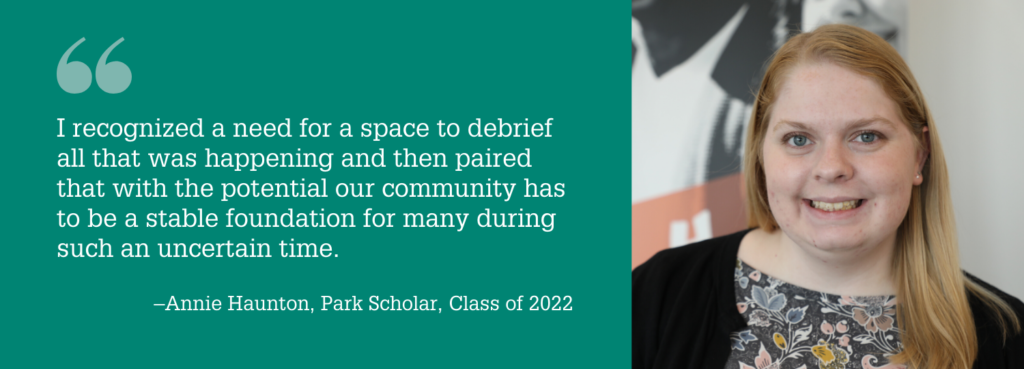Article by Kirsten Chang | Institute for Emerging Issues

Major: Biological Sciences: Integrative Physiology and Neurobiology
Minors: Sociology, Global Health
Classification: Sophomore
Hometown: Hickory, NC
Other Activities: Park Scholarships (Class of 2022), University Scholars Program, Alternative Service Break Trip Lead, (Founding and Acting) Associate Director for the Global Health Cooperative at NC State, Service Raleigh Committee Member
The Park Scholarship is a four-year scholarship awarded on the basis of outstanding accomplishments and potential in scholarship, leadership, service, and character. Annie is a member of the 2022 Class of Park Scholars and is working with IEI on its Service Year NC project.
In the wake of the COVID-19 pandemic, Annie took the initiative to start a video support group for her fellow Park Scholars. Here’s what Annie had to say about it:
“I reached out to the Park Scholarships’ office a few days after the announcement came out that spring break would be extended and classes would be moving online. The school’s decision hit me hard as I abruptly recognized the world was changing and that my normal would no longer be that, normal. As I reflected further, I sensed a growing collective anxiety amongst myself and my peers. I recognized a need for a space to debrief all that was happening and then paired that with the potential our community has to be a stable foundation for many during such an uncertain time. The Park office supported me in hosting an open Zoom call for students, faculty, and staff connected with the program. In planning the session, I had two main intentions for participants to (1) share initial thoughts, feelings, and reactions with others, and (2) to unite service-minded individuals in the face of great community need toward brainstorming responses.
The session took place on Thursday, March 19. In my mind, it was a great success! 22 people, representing all four undergraduate levels as well as faculty and staff, were in attendance. We were able to have deep, intentional conversation about the aforementioned objectives and as a group came up with a list of additional ways to support each other, specifically over the next few months. The most time-urgent initiative we are acting on is conducting one-on-one check-ins with all 150+ scholars in the program to ensure they have a safe place to stay and identify any stressors (food or financial insecurity, mental health, etc.) that we may be able to assist in alleviating. Moving forward, it is my hope not only that the original video session brought a little comfort or ease to participant’s minds but also that a chain-reaction of community-minded activities will come forth continuing to build care and camaraderie amongst one another in the program and beyond.”
Annie, you inspire us!
What interests you about working at IEI?
I first met Darryl and Maggie, the two IEI leads for Service Year NC, as part of the Park Scholarship’s Civic Engagement Fair. I had a high interest in working them initially because of my awareness for the Institute’s reputation for having productive critical conversations, and I was considering adding a service year to my own path following graduation from NC State. Now that I am more familiar with the Service Year NC initiative, my interest lies in getting to utilize my strengths to access the strategic plan and problem solve ways to achieve such goals. To me, I also very much enjoy working on a project that has multi-level, multi-sector stakeholders as I believe such skills will be beneficial to a future career in public health and/or capacity building. It is rewarding to know that I’m able to devote my time to a program that invests in individuals and communities, especially those that may not typically have the most access to such opportunities, while ultimately improving the well-being for all in our state.
What do you believe is the biggest emerging issue facing our state?
While there are many important challenges and opportunities facing our state, I believe the biggest issue is climate change. Climate change poses many direct threats to North Carolina specifically including increasing storm severity, lost coastline communities, increased heat-related illness and injury, reduced agricultural productivity, and more. However, the two factors that pushed it to the top of my list were (1) the urgency and (2) its high potential for exacerbating existing political, economic, and social disparities in our society such as the unaffordable housing crisis, racial vulnerabilities, the wealth gap, and environmental public health concerns.
This article was written by Kirsten Chang and originally published by the Institute for Emerging Issues.